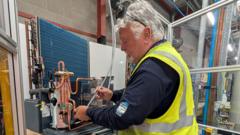Are Heat Pump Makers Prepared for a Customer Surge?

## The Future of Heating: Exploring Octopus Energy's Heat Pump Factory in Craigavon, Northern Ireland
As global temperatures rise, the urgency to decarbonize our energy systems becomes increasingly apparent. The UK government has set ambitious targets for transitioning from traditional fossil fuels to renewable energy sources, with a particular focus on domestic heating. This article explores the innovative work being done at Octopus Energy's heat pump factory in Craigavon, Northern Ireland, and examines the broader implications for the UK’s energy landscape.
### Understanding Heat Pumps and Their Role in Decarbonization
Heat pumps are a key technology in the fight against climate change. Unlike conventional heating systems that rely on oil or gas, heat pumps utilize electricity to transfer heat from the environment into homes. This process not only reduces greenhouse gas emissions but also helps tackle the escalating energy costs associated with fossil fuels.
#### How Do Heat Pumps Work?
Heat pumps operate on a simple principle: they absorb heat from the surrounding environment, which can be air, water, or even the ground. Here’s a breakdown of the process:
1. **Heat Absorption**: The heat pump absorbs ambient heat using a refrigerant, which changes from liquid to gas.
2. **Compression**: A compressor then compresses the gas, raising its temperature significantly.
3. **Heat Transfer**: The hot gas passes through a heat exchanger, transferring heat to the water circulating within the home’s heating system.
4. **Recycling**: The refrigerant cools down, returns to a liquid state, and the cycle continues.
This technology can yield multiple kilowatts of heat for every kilowatt of electricity consumed, a ratio known as the coefficient of performance (COP). The higher the COP, the more efficient the heat pump, making it a cost-effective option for homeowners.
### Octopus Energy’s Innovative Approach
At the Octopus Energy factory in Craigavon, the team is dedicated to producing heat pumps that not only adhere to industry standards but also innovate in design and efficiency. The factory can currently produce 600 units per month, with plans to double capacity soon. This manufacturing operation is unique among electricity providers, as most companies rely on third-party manufacturers.
#### Patented Technology and Design Features
The heat pumps manufactured by Octopus Energy sport several unique features that differentiate them from competitors:
- **Internal Metal Plate**: A patented design allows refrigerant to flow through an internal metal plate, which absorbs heat from the machine's electronics and enhances overall performance.
- **Insulation Beads**: The heat pump casing incorporates small grey insulation beads aimed at minimizing heat loss, similar to materials used in building cavity wall insulation.
These design choices contribute to improved efficiency and performance, which are critical for homeowners when considering a switch from traditional heating methods.
### The Current Landscape of Heat Pump Adoption in the UK
Despite the technological advancements and the promise of lower running costs, the adoption of heat pumps in the UK remains sluggish. The government aims for 600,000 installations annually by 2028; however, recent figures indicate that sales fell below 100,000 in 2024. Factors influencing this slow uptake include:
- **Cost Competitiveness**: With gas prices fluctuating, heat pumps are struggling to compete with gas boilers on running costs.
- **Installation Quality**: The efficiency of a heat pump heavily relies on the quality of its installation. Poor installation can lead to significant inefficiencies, with COP ratios varying dramatically.
### The Importance of Public Acceptance
For heat pumps to gain traction, public perception and confidence in the technology must improve. Surveys conducted by Octopus suggest that many customers find their heat pumps cost the same or less than their previous gas boilers, while also providing improved comfort levels.
#### The Role of Subsidies and Incentives
Government subsidies play a vital role in encouraging the transition to heat pumps. However, Northern Ireland is currently at a disadvantage, lacking widely available grants to subsidize installation costs. This situation is particularly ironic given the region's high reliance on oil heating systems.
The director general of the European Heat Pump Association, Paul Kenny, emphasizes that taxing fossil fuels more heavily could spur demand for electric heating appliances. He notes that many factories, including Octopus Energy’s, are operating below capacity due to reduced demand.
### The Path Forward: Challenges and Opportunities
As the UK aims to meet its climate goals, addressing the barriers to heat pump adoption is crucial. The challenges include:
1. **Cost and Affordability**: Without adequate support, many homeowners may find heat pumps financially unviable.
2. **Public Awareness**: Increasing knowledge about the benefits and functionality of heat pumps is essential.
#### Opportunities for Growth
Despite these challenges, there are significant opportunities for growth within the heat pump sector:
- **Technological Advancements**: Continuous innovation can lead to even more efficient and cost-effective heat pumps.
- **Policy Support**: Stronger government policies and incentives can encourage homeowners to make the switch to electric heating solutions.
### Conclusion: A Call to Action
Octopus Energy’s heat pump factory stands as a beacon of innovation in the realm of renewable energy. As the UK grapples with the impacts of climate change, the transition to heat pumps represents a crucial step toward a more sustainable future. The role of government, industry, and consumers is paramount in achieving this goal.
What does the future hold for heat pumps in the UK? As we push toward a greener energy landscape, the commitment to renewable technologies such as heat pumps will determine the success of our decarbonization efforts.
### Frequently Asked Questions (FAQs)
#### What are heat pumps, and how do they work?
Heat pumps are devices that transfer heat from the environment into a home, using electricity to absorb and amplify ambient heat. They operate by compressing a refrigerant to produce heat, which is then circulated within a home’s heating system.
#### How efficient are heat pumps compared to traditional heating systems?
Heat pumps can produce several kilowatts of heat for every kilowatt of electricity consumed, often achieving a coefficient of performance (COP) of 3 to 4, which is significantly more efficient than traditional gas or oil heating systems.
#### What factors influence the performance of a heat pump?
The performance of a heat pump can be influenced by several factors, including the quality of installation, the design of the unit, and environmental conditions. Proper installation is crucial for maximizing efficiency.
### Final Thoughts
As we consider the path forward in energy transition, the success of heat pumps will hinge on collaboration among manufacturers, policymakers, and consumers. How can we further innovate and support the shift toward renewable heating solutions?
#EnergyTransition #HeatPumps #SustainableHeating
Published: 2025-07-14 23:02:18 | Category: technology



